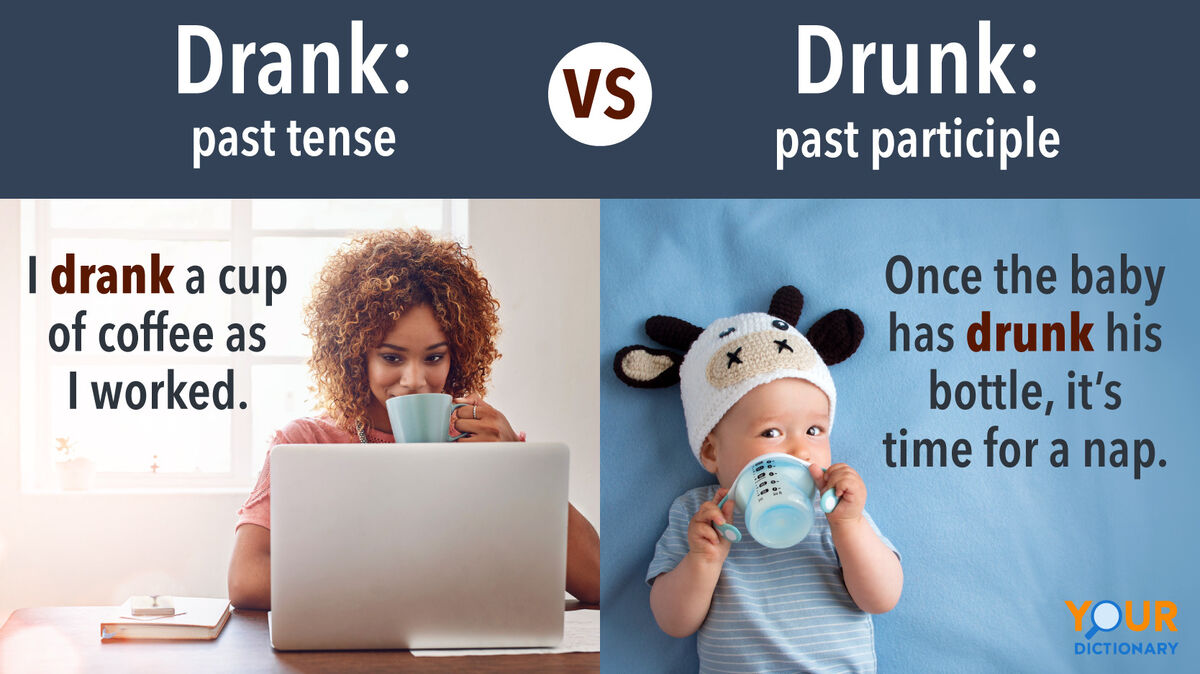
Have you ever drank a whole bottle of juice? Or should that be drunk a whole bottle of juice? Which one is correct, and when do you use the other one? Learn the difference between drank vs. drunk, and never doubt your word choice again.
How to Tell Drank and Drunk Apart
The key to understanding drank and drunk lies in their grammatical function. While they are both forms of the verb "to drink," you use them in different tenses.
- drank - past tense form
- drunk - past participle form (used with have, has or had)
If you drank juice yesterday, use drank. If you have drunk juice since you were a child, use drunk. Basically, drank is for past tense (a specific point in time) and drunk is for perfect tenses (an indefinite point in time).
The Easiest Way to Use the Right Word
Sometimes you just need a simple trick to pick the right word. In the case of drank and drunk, it's easier than it looks!
- Are you using it with have, has or had? Use drunk (I have drunk, she has drunk, and so on).
- Are you using it without have, has or had? Use drank (I drank, she drank, and so on).
Like all past participles, drunk requires the linking verb have to form the perfect verb aspect. It indicates that something happened in the past, but its timing isn't specific.
Meaning of Drank: Past Tense of Drink
Drank is the correct word to use when you're talking about something that happened at a specific time in the past. It doesn't vary by speaker; using drank with singular or plural subjects is always correct in past tense. For example:
- I drank a cup of coffee as I worked.
- You drank all the nonfat milk!
- The baby drank her entire bottle.
- We drank one glass of wine each.
- They drank the last case of beer in the house.
The sentence may or may not indicate when someone drank their drink, but it reflects a simple action that took place before this moment.
Meaning of Drunk: Past Participle of Drink
The word drunk has the same meaning as drank ("to drink in a time before today"), but it appears in every verb tense with the perfect aspect. Additionally, drunk always comes after has, had or have when used as a verb in the active voice.
In the past perfect tense, it looks like this:
- We had drunk too much wine that night.
- Marissa had drunk three bottles of soda before feeling sick.
When you're writing in the present perfect tense, it may look like this:
- The table has drunk three bottles of wine already
- Has the baby drunk his water yet?
And when you use drunk in the future perfect tense (using will have), it looks like this:
- I will have drunk every type of tea by the time dinner's over.
- By the end of the night, the kids will have drunk their cocoa and eaten their cookies.
If these sentences feel awkward to you, consider rewriting them to remove the perfect aspect. For example, "the kids will have drunk their cocoa" becomes "the kids will drink their cocoa" in the simple perfect tense.
How to Use Drunk as an Adjective
The most common way to use drunk in a sentence is as an adjective. In this form, drunk means "impaired due to drinking too much alcohol." For example:
- If you're drunk, you must not drive home.
- The drunk customers left when security arrived.
- Bartenders aren't allowed to serve people who are visibly drunk.
Why the Different Endings?
The Germanic verb drink is a strong verb, meaning that its stem vowel sound changes when conjugated. But it's certainly not the only verb with such different vowel sounds in its past tense and past participle forms. Other strong verbs in English include:
- ring (rang/rung)
- sing (sang/sung)
- sink (sank/sunk)
- stink (stank/stunk)
- swim (swam/swum)
Not all irregular verbs with -ink or -ing endings are conjugated in this way. For example, think rhymes with drink, but its past tense and past participle form is thought. Learning the different conjugations of irregular verbs is one of the biggest challenges of using proper English grammar.
Drink Up More Grammar Advice
Writing well isn't as simple as following quick tips about tricky word pairs. However, every time you clear up a grammar misunderstanding such as drank vs. drunk, you can clean up your writing just a bit more. Try more grammar challenges with a guide to the difference between conscience vs. conscious.